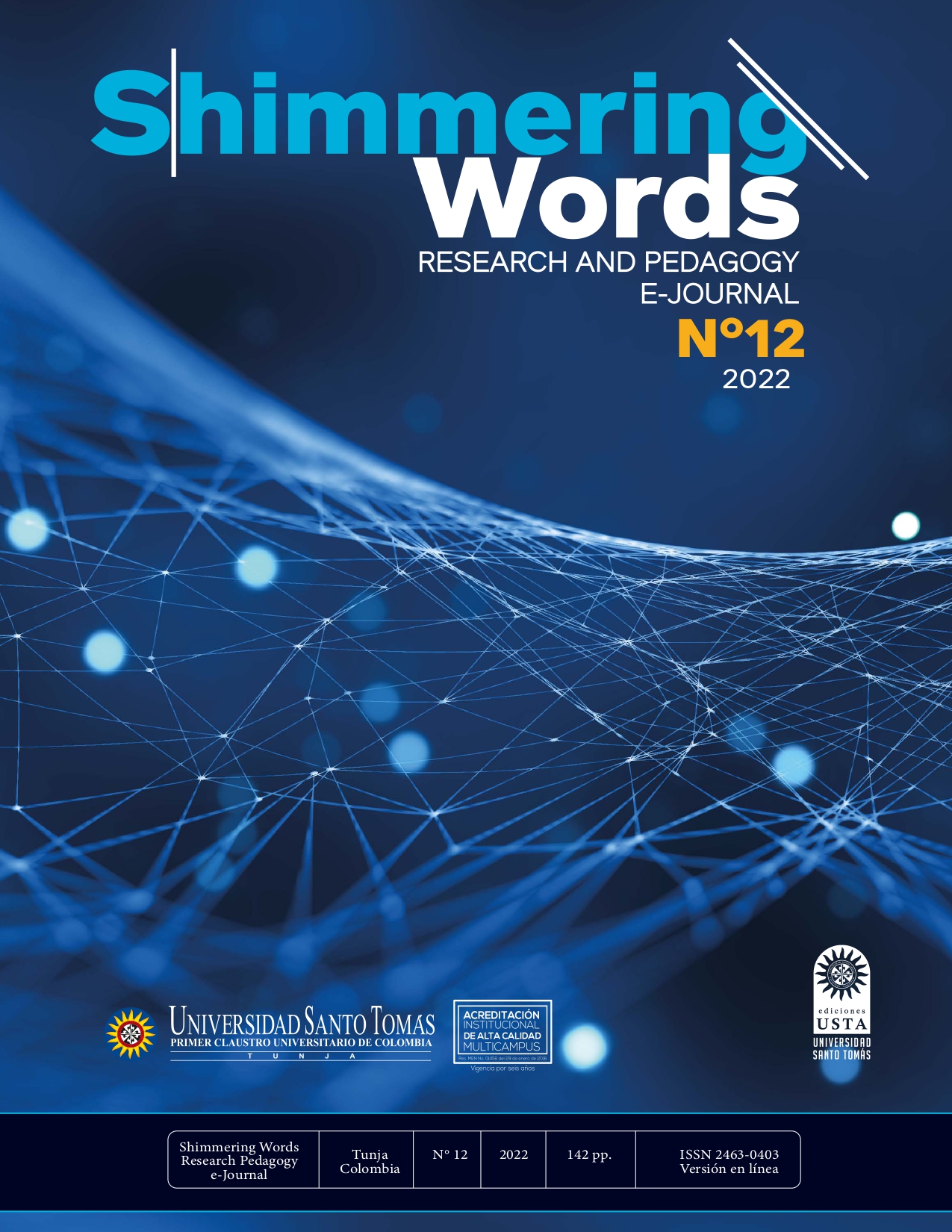Fostering Students’ Speech Based on Academic Videos
Contenido principal del artículo
Resumen
Este artículo reporta un estudio de investigación acción sobre el impacto de desarrollar la producción oral de los estudiantes a través de videos académicos en una universidad privada de Colombia. El objetivo principal de este estudio fue describir el impacto de los videos académicos como estrategia para fomentar la competencia oral en inglés con estudiantes de Derecho. Los datos fueron recopilados con estudiantes de sexto semestre con el fin de fomentar y mejorar el uso del inglés, guiar al aprendiz para ser crítico en temas legales en un idioma extranjero mediante el uso de tres instrumentos los cuales fueron diario de estudiantes, observación y videos. Los resultados demostraron como los profesores de inglés lograron implementar nuevas técnicas y metodologías que contribuyeron a mejorar el nivel de inglés. En conclusión, los estudiantes de Derecho tuvieron más posibilidades de hacer uso del idioma inglés en diferentes contextos y asociar la parte teórica legal con los procesos de enseñanza y aprendizaje del inglés.
Detalles del artículo
Cómo citar
Arias Rodríguez, G. L., & Roberto Flórez, E. E. (2023). Fostering Students’ Speech Based on Academic Videos. Shimmering Words: Research and Pedagogy E-Journal, 12(1), 122-142. Recuperado a partir de http://revistas.ustatunja.edu.co/index.php/shimmering/article/view/2752
Número
Sección
Artículos
Citas
Baimba, A. (1992). Physics teachers’ action-research experience with a teaching module on “ force”.Research in Science Education. University of Arkansas
Baškarada, S. (2013) Qualitative Case Study Guidelines. Australian Government Department of Defence.
Burkart, G. (1998). Spoken language. Modules for the profesional preparation of teaching assistants in foreign lagnuage. Washington, DC: Center for Applied Linguistics.
Cakir. I. (2006). The use of video as an audio-visual material in foreign language teaching classroom. The Turkish Online Journal of Education Technology. Kirikale Universitesi, Egitim Fakultesi.
Chan D. and Herrero C. (2010). Using Film to teach Languages. England: Manchester Arts Centre Ltd.
Duan, P. and Gu, W. (2005). English for specific purposes: The development of technical communication in China’s universities. Technical Communication, 52 (4). 434 – 448.
Dueñas, F. (2010). Learner-Centered Curriculum: A step Towards English Speaking Skill. Improvement of Non – English Teachers. Enletawa Journal Nª 3 UPTC.
Fandiño, Y., Bermúdez J. & Lugo, V. (2012). Retos del Programa Nacional de Bilingüismo. Colombia Bilingüe. Educ. Vol. 15, No. 3, 363-381.
Ferrance E. (2000). Action Research.U.S. Lab Northeast and Islands Regional Educational Laboratory| at Brown University.
Hubbard and Miller (1993). Stages to systematize information. Memorias congreso 2019 Instituto de idiomas.pdf (usta.edu.co)
Mattila, H. (2006). Legal language: history. In Keith Brown (ed.) Encyclopedia of language andlinguistics. Oxford: Elsevier. 8 – 13.
Merriam, S. (1998). Qualitative research and case study applications in education. San Francisco: Jossey-Bass.
Noffke, S.E., & Stevenson, R.B. (Eds.). (1995). Educational action research: Becoming practically critical. New York: Teachers College Press.
Prieto, C. (2007). Improving Eleventh Graders’ Oral Production in English Class through Cooperative Learning Strategies
Rothbauer, Paulette M. (2008) “Triangulation.” The Sage Encyclopedia of Qualitative Research Methods, edited by Lisa Given. Sage Publications. Shimmering Words 16.indd (ustatunja.edu.co)
Strauss, A. & Corbin, J. (1990). Basics of qualitative research: Grounded theory procedures and techniques. Sage Publications, Inc, 2nd edition.
Rahimia, M. (2011). Metacognitive strategies awareness and success in learning English as a foreign language. English Department, Faculty of Humanities, Shahid Rajaee Teacher Training University, Lavizan, Tehran, 1678815811, Iran. Sharon J. Derry (2007). Guidelines for video research in education recommendations from an expert panel.
Taylor E. and Sara S. (1996). Collecting Evaluation Data: Direct Observation. Program Development and Evaluation. Cooperative Extension: University of Wisconsin.
Zohrabi, M: (2013). Mixed Method Research: Instruments, Validity, Reliability and Reporting Findings. Iran: University of Tabriz.
Zubiría, J. (2006). Las competencias argumentativas: la visión desde la educación.Magisterio.
Baškarada, S. (2013) Qualitative Case Study Guidelines. Australian Government Department of Defence.
Burkart, G. (1998). Spoken language. Modules for the profesional preparation of teaching assistants in foreign lagnuage. Washington, DC: Center for Applied Linguistics.
Cakir. I. (2006). The use of video as an audio-visual material in foreign language teaching classroom. The Turkish Online Journal of Education Technology. Kirikale Universitesi, Egitim Fakultesi.
Chan D. and Herrero C. (2010). Using Film to teach Languages. England: Manchester Arts Centre Ltd.
Duan, P. and Gu, W. (2005). English for specific purposes: The development of technical communication in China’s universities. Technical Communication, 52 (4). 434 – 448.
Dueñas, F. (2010). Learner-Centered Curriculum: A step Towards English Speaking Skill. Improvement of Non – English Teachers. Enletawa Journal Nª 3 UPTC.
Fandiño, Y., Bermúdez J. & Lugo, V. (2012). Retos del Programa Nacional de Bilingüismo. Colombia Bilingüe. Educ. Vol. 15, No. 3, 363-381.
Ferrance E. (2000). Action Research.U.S. Lab Northeast and Islands Regional Educational Laboratory| at Brown University.
Hubbard and Miller (1993). Stages to systematize information. Memorias congreso 2019 Instituto de idiomas.pdf (usta.edu.co)
Mattila, H. (2006). Legal language: history. In Keith Brown (ed.) Encyclopedia of language andlinguistics. Oxford: Elsevier. 8 – 13.
Merriam, S. (1998). Qualitative research and case study applications in education. San Francisco: Jossey-Bass.
Noffke, S.E., & Stevenson, R.B. (Eds.). (1995). Educational action research: Becoming practically critical. New York: Teachers College Press.
Prieto, C. (2007). Improving Eleventh Graders’ Oral Production in English Class through Cooperative Learning Strategies
Rothbauer, Paulette M. (2008) “Triangulation.” The Sage Encyclopedia of Qualitative Research Methods, edited by Lisa Given. Sage Publications. Shimmering Words 16.indd (ustatunja.edu.co)
Strauss, A. & Corbin, J. (1990). Basics of qualitative research: Grounded theory procedures and techniques. Sage Publications, Inc, 2nd edition.
Rahimia, M. (2011). Metacognitive strategies awareness and success in learning English as a foreign language. English Department, Faculty of Humanities, Shahid Rajaee Teacher Training University, Lavizan, Tehran, 1678815811, Iran. Sharon J. Derry (2007). Guidelines for video research in education recommendations from an expert panel.
Taylor E. and Sara S. (1996). Collecting Evaluation Data: Direct Observation. Program Development and Evaluation. Cooperative Extension: University of Wisconsin.
Zohrabi, M: (2013). Mixed Method Research: Instruments, Validity, Reliability and Reporting Findings. Iran: University of Tabriz.
Zubiría, J. (2006). Las competencias argumentativas: la visión desde la educación.Magisterio.

